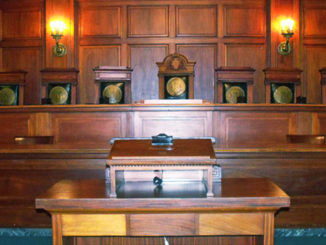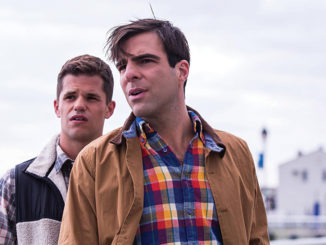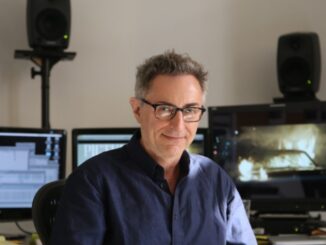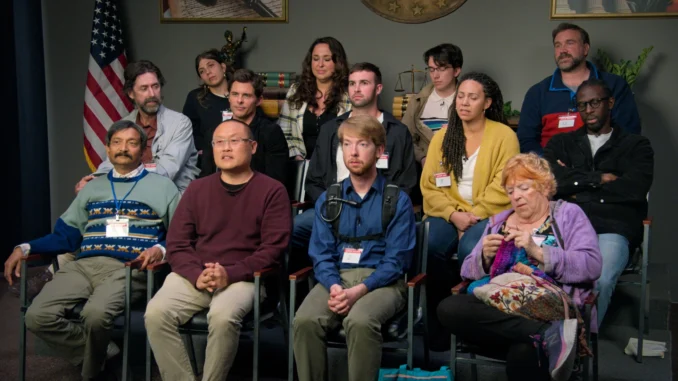
By Rob Feld
It wasn’t just another day in court.
The team of editors behind “Jury Duty” — Diana Fishman, Adam Lichtenstein, Mary DeChambres, and Steven Rosenthal — had the opportunity to work with some unique material.
Amazon Freevee’s eight episode improv docu-comedy (it’s not exactly a prank show), “Jury Duty” follows Ronald Gladden, an unsuspecting and uncommonly virtuous young man, who believes he is selected to sit on a jury during a filmed trial in California. In fact, the three-week trial and jury sequestration are a setup. The case and witnesses are fake, the lawyers and judge are fake, and his fellow jurors are improv actors, including James Marsden, playing himself as a reluctant juror and self-involved movie star.
The whole endeavor was a high-wire act that could have fallen apart at any moment, had Ronald seen through the artifice of the idiosyncratic characters surrounding him. The show’s creators had extensively scripted events with backup options, depending on Ronald’s choices and reactions. What is particularly impressive about the setup and the narrative the editors crafted, is that they kept Ronald an active protagonist rather than a mere pinball bouncing from set piece to set piece. Ronald’s agency quickly emerges and begins guiding the story, even as he responds to planted suggestions. This was new territory for the entire team, and the show had to be discovered as it was being created.
CineMontage: What were your expectations of this strange thing, and how did they match reality?
Diana Fishman: When I was first approached, they actually had a script where the unscripted character was written in with the understanding that he wouldn’t necessarily respond in that way. So, I had in my head a sitcom-y kind-of vibe. But when I was interviewed, it was made very clear that it wasn’t a prank show. It was supposed to be fun and funny, but the hero character was never to be the butt of the joke. He was the straight man in a comedy context.
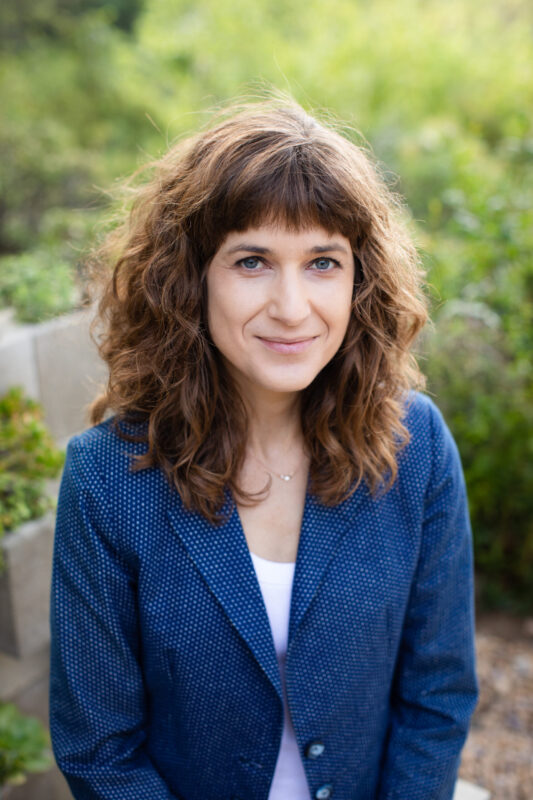
Steven Rosenthal: I was blown away by the ambition of it all, but the producers were very vague about what the final product would be. I asked in the interview, “So, it’s an improvised mockumentary?” Not really. “A prank show?” Kind of. We ended up focusing on the original pitch, which was to put an unwitting guy in an “Office”-like sitcom. But in production and early edits, it wasn’t clear what that would look like or if it was even possible. It’s as if we made “The Truman Show” for real, except most of the time you’re not watching the movie “The Truman Show.” Instead you’re watching the TV show they’re making in “The Truman Show.” The decision to live in the fake “sitcom” took a while to arrive at.
CineMontage: Were you surprised at all by what you found you had to track to make the story work?
Rosenthal: Aside from the occasional improvised turn, the story beats were all there in the outline. So, it wasn’t about what to track, it was how. Compressing an hour of lunch footage or several hours of witness testimony into something that plays fast and funny was the biggest hurdle. And that’s why the post schedule looked more like [that of] a feature doc than a half-hour comedy.
Fishman: With such a big ensemble cast, you had to track each of their individual stories, as well as the court case to follow it to the end. You had to understand what was going on enough to care that Ronald was leading the deliberations and swaying characters. The number of stories that needed to play within the short amount of time was challenging.
CineMontage: Tell me about how you handled Ronald in the edit. He wasn’t going to be the butt of the joke, so you had to protect him. The audience couldn’t feel like he was being victimized. How did you nurture his story?

Adam Lichtenstein: Luckily for us, Ronald was a really sweet, kindhearted, generous guy. He was possessed of a lot of affection for everyone around him. He had a love for Todd that was very special. He was our guide through this footage. He always held the key to how to play a moment. Often in reality television, producers will have you bend the footage to their will. But here it was Ronald who was bending us to his will and his good nature. We had a lot of incredible luck with a really great guy who had a natural charisma, who shouldered the tone of the show along with us.
CineMontage: Was there a surprise moment that really aided the storytelling for you?
Lichtenstein: The way Ronald took over and embraced being foreman of the jury was unexpected. It was what the producers wanted, but that’s the moment when he really fell into line. He could have been a real drip at that moment, but he played a very impartial role during deliberations. He took it seriously. That helped the show and created a crescendo that was necessary for the arc of the episode and of the entire series; to have what they were calling a “12 Angry Men” moment. Anything he would have done would have been fine because he was Ronald and he was an ideal character, but he really became a rockstar at that moment, and that was a big plus for us.
Fishman: Another gift was right in the first episode when Ronald tells Noah about the “Family Guy” episode. The ideal was that he would tell Noah to pretend to be racist to get out of jury duty, but nobody gave him that line. He just picked it up!
Mary DeChambres: It was in the script, remember, and they were hoping he would go there.
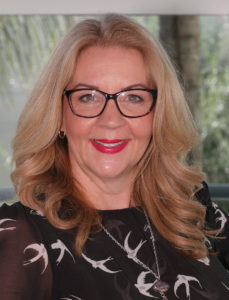
Fishman: They were egging him on, but he just filled it right in.
Lichtenstein: It’s important to note that Ronald wasn’t some fool or predictable guy. What I think it points more to is the competency or preparedness of the writers and the executive producers.
Fishman: They would provide a cue, and if that didn’t work, they had a backup for how to get to the story that they wanted to. And if it didn’t work, they had another backup to play.
CineMontage: What did it look like when you first started putting it together?
Rosenthal: The challenge was, it isn’t shot like a sitcom and it isn’t paced like a sitcom, because actors were doing this in real time, and always riding that line trying to convince Ronald it’s real. And of course, our protagonist is never acting on a sitcom level, because he’s not acting at all. It wasn’t until we started intercutting scenes with moments from the unscripted interviews that it started to seem like we could pull off something sitcom-ish. I say sitcom-ish because it’s not like anyone could confuse this with the perfection of “The Office” or “Parks and Rec,” but I now think the parts of it that might feel a little clunky also lend it some authenticity that serves the comedy in an interesting way. We were trying our best to get that perfect, zippy sitcom pace, though.
Fishman: The first pass seemed kind of factual and dry as the court case went forward. But as we started finding funny moments in the break room or when their reactions to the case were humorous, we started going backwards to find connecting moments. So, it was building these little pods around funny moments. This mashup of almost sketch comedy and documentary felt unique.
CineMontage: Did that become the process? Lay down the skeleton and then add the fat?
Fishman: I did a lot of different little pods and a bunch of string-outs. Then all the editors and Jake, the director, would watch them and choose on what to hang the episode. Some of them were beats that were already decided, and some were surprises.
Lichtenstein: I’m thinking of when, during jury selection, Ronald and James Marsden are talking about “Sonic the Hedgehog.” Ronald is talking about how good Ben Schwartz was in that show, and you pick up shots of Marsden being disappointed that his performance wasn’t singled out by Ronald—you get these face-falling shots. That’s the kind of thing that you may or may not find on the first pass through, but then when you go looking for it, there it is. And suddenly you have an audience identifying with Marsden and enjoying the comedy of him being a selfish, self-centered actor who’s now being insulted. He takes things so hard because he’s so in love with himself. That’s the kind of thing that you mine over a long period of time. You find the bits and pieces that add up to a character and a story. So, that becames a thread throughout the entire show, where Marsden is so fragile and Ronald is being so curious or identifying with Marsden’s career, and Marsden being hurt that he doesn’t get recognized at every beat.
Rosenthal: There’s a bit at the end of a crucial scene where James Marsden is consoling Noah (Mekki Leeper) about his cheating girlfriend that is completely improvised. Marsden just went for it and Mekki played along brilliantly. Only one camera caught it, so the director and the control room didn’t even know it happened. Finding a gem like that really drove home how important it was for us to watch absolutely every moment of the footage.
CineMontage: The finale then leaves the story and takes Ronald behind the scenes of everything he had just gone through.
Mary DeChambres: I wanted to show, in the most subtle, organic way, the interaction between the control room and all of the improv actors. I was very deliberate when I showed Jake giving direction to the judge to move the microphone, for example. You don’t realize how many times that has been happening, but it paints the picture of the whole process. Designing the reveal was hard, too. At one point, we had a sit-down interview with all the executive producers where they explained how they came up with the concept of the show, before we even got to the reveal, but it just slowed it down and it took you away from Ronald. You’re so invested in Ronald and these characters, that’s who you want to hear from. That’s why we decided to tell the story and reveal more from Ronald’s point of view. But what I love about the finale is that you get a glimpse of those moments where they almost cracked, like when they see the animation for the first time in the courtroom. You realize there’s two reasons why the improv actors are laughing at it: it’s ridiculous, but they’re also so surprised by it that they’re about to break character.
CineMontage: How were you interacting with production?
Fishman: I started first and was cutting while they were shooting, which I think was about three weeks. I was hearing things each day but had very little interaction with the field. I did get the daily feed on the day of the big reveal, but it wasn’t like they told us what to look out for on that day. But it showed us that the process worked: we knew we had a show at that point, so we were off and running. It could have gone a very different way. Ronald could have gotten mad, or the production could have ended on any day if he queued into what was happening. So, getting to the reveal was the first win in the process, and that Ronald lived to love it.
Rosenthal: I came on midway through shooting, and production was just praying to get through to the end without Ronald finding out, so they left us alone for quite a while. That was helpful because we had a lot of material to get our heads around.



